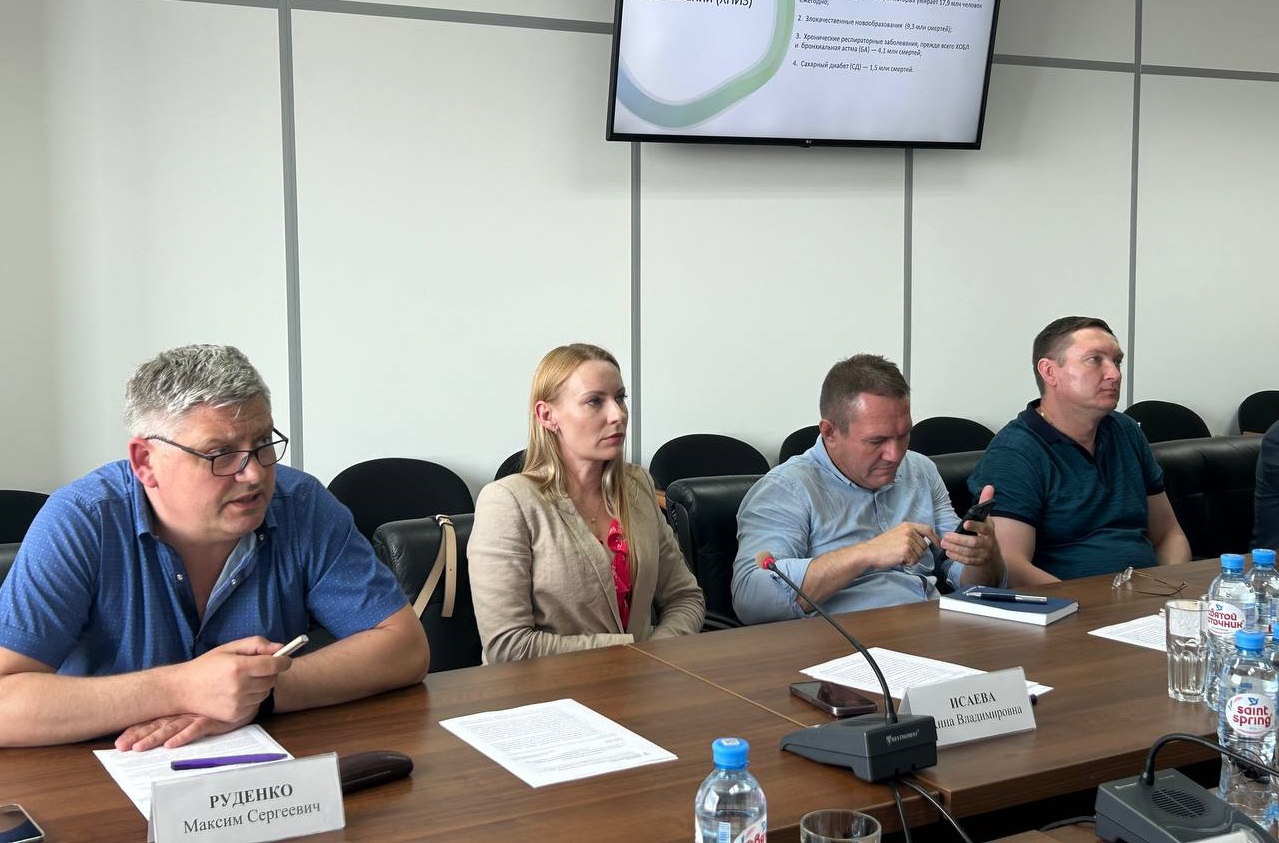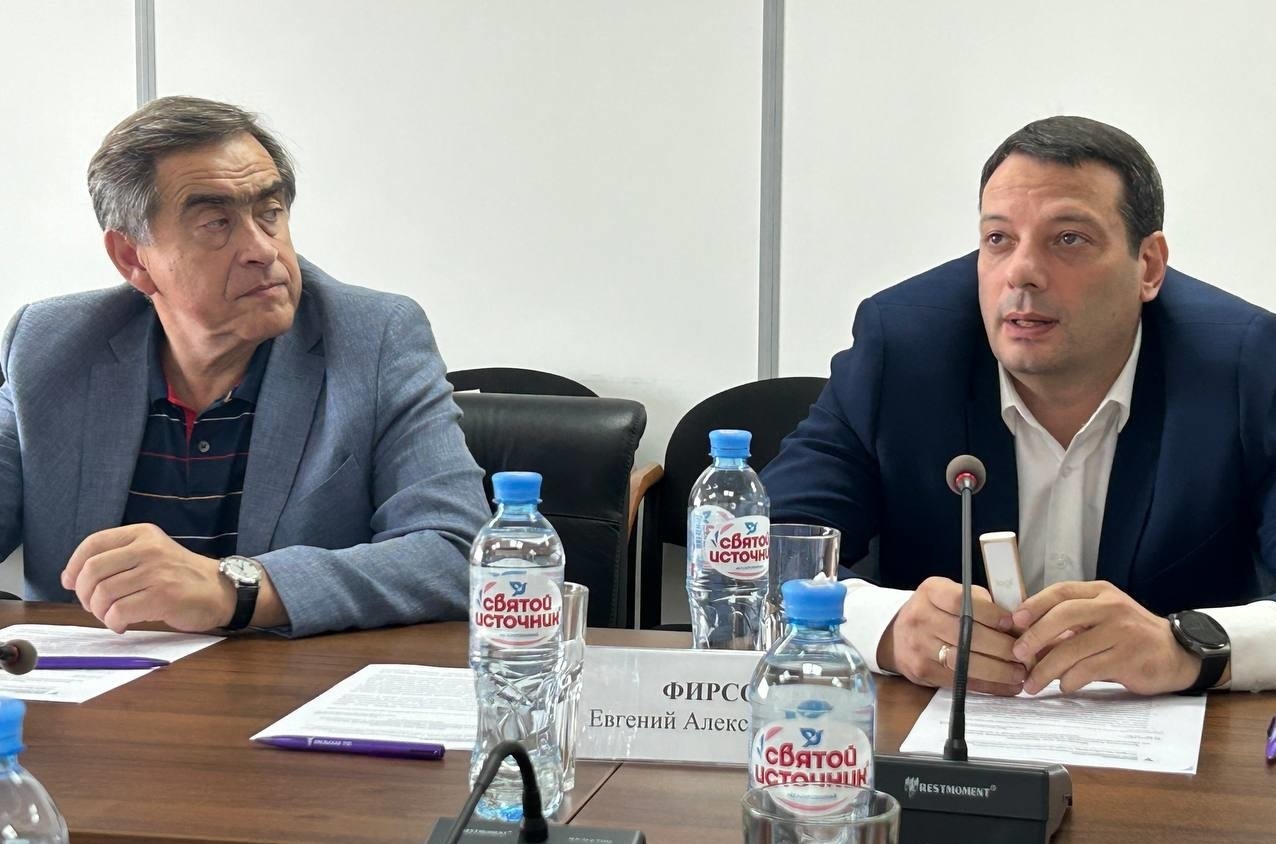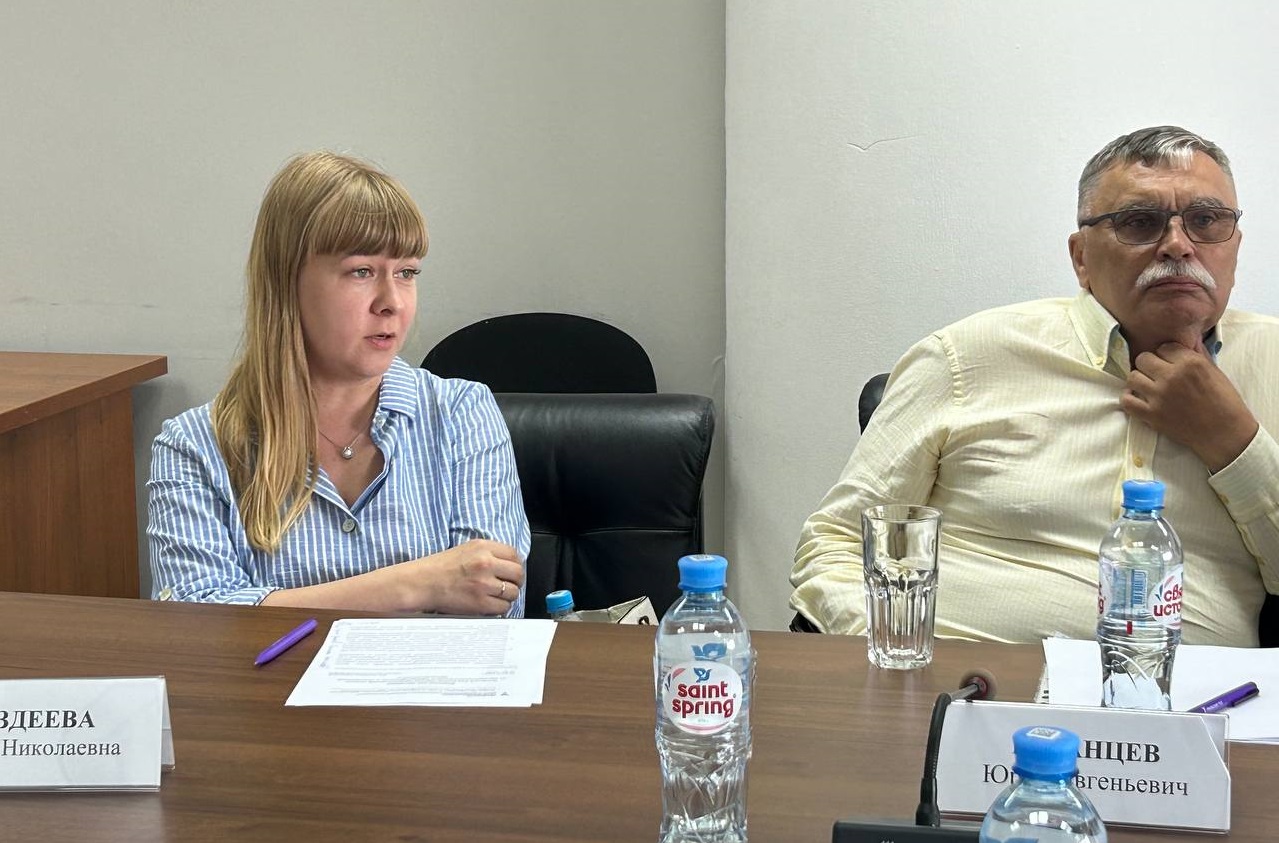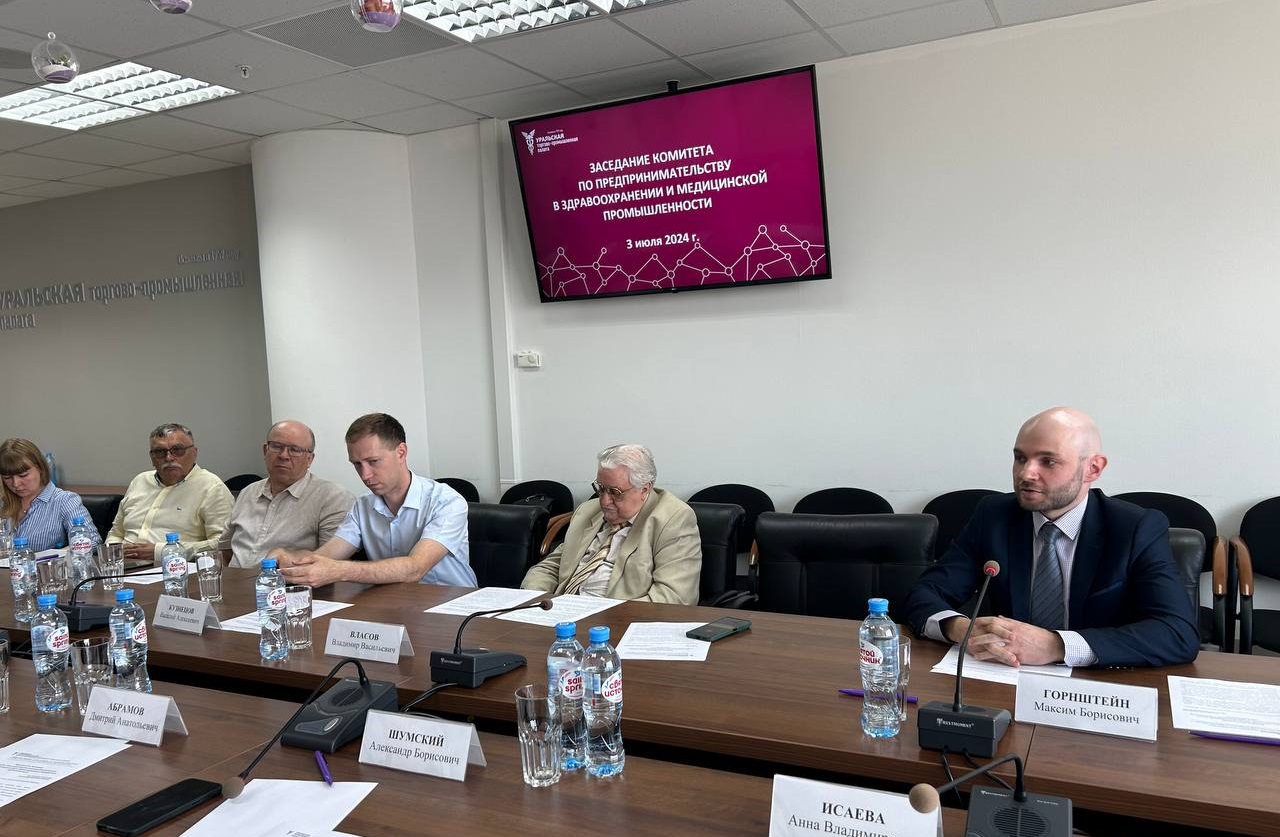- Home
- News
- The Ural Biomedical Cluster discusses the issue of government procurement of domestic medical products and corporate health promotion programs for employees at the meeting held at the Ural Chamber of Commerce and Industry
The Ural Biomedical Cluster discusses the issue of government procurement of domestic medical products and corporate health promotion programs for employees at the meeting held at the Ural Chamber of Commerce and Industry
A meeting of the Committee on Entrepreneurship in Healthcare and Medical Industry of the Ural Chamber of Commerce and Industry was held on July 3, 2024, chaired by Alexander Petrov. The meeting was dedicated to the relationship between the labour productivity and the modification of risk factors in medical institutions of the Sverdlovsk Region, as well as the issues of government procurement of medical products and medicines from domestic manufacturers.
The meeting was attended by members of the Association of Medical Specialists for Risk Modification (AMSRM), the Association of Medical and Pharmaceutical Manufacturers of the Sverdlovsk Region, the Ural Biomedical Cluster and representatives of the Ural Chamber of Commerce and Industry.
«Today, one of the main aspects of labor productivity and health of citizens is motivating employees to lead a healthy life. Modification of risk factors and minimization of their adverse impact is one of the priorities of any business,» said the Chairman of the Committee Alexander Petrov in his welcoming speech.
Anna Isaeva, a member of the AMSRM Association, candidate of medical sciences, cardiologist, deputy chief physician for organizational, methodological and clinical expert work at the Center for Cosmetology and Plastic Surgery named after S.V. Nudelman, spoke at the meeting about the role of modification of risk factors in increasing labor productivity.
According to the speaker, the main risk factors disabling the population are still smoking, excess body weight and hyperglycemia. The concept of harm reduction can be used to minimize risks in a group of patients who are not ready to make drastic lifestyle changes and completely eliminate these risks. For example, the «Traffic Light» food labeling introduced in 2018 by Rospotrebnadzor allows consumers to understand how much fat, salt and sugar a product contains. The speaker paid special attention to the problem of smoking and the issue of introducing alternative products (delivering nicotine while bypassing the combustion process) for smokers who are not motivated to quit – this approach is reflected in foreign specialized clinical recommendations. According to Anna Isaeva, only 7.8% of citizens in the Sverdlovsk Region lead a healthy life today, which is far behind the anti-healthy lifestylers, who take up 45.4%.
«The main task of the medical specialists of the AMSRM Association is to consolidate the participation of all the four parties, which are not only patients and healthcare, but also the government and business, in order to achieve the common goal of reducing mortality caused by chronic non-communicable diseases,» summarized Anna Isaeva. The speaker mentioned a number of proposals from her colleagues to carry out events aimed at preserving the life and health of employees during their labour activities: they are popularization of a healthy lifestyle, competitions among organizations, revision of the menus in canteens, doing exercises and organizing designated smoking areas.
Developing the topic of modified risk factors, Maxim Rudenko, a member of the AMSMR Association, head of the thoracic surgery department of the Sverdlovsk Regional Oncology Center, oncologist, thoracic surgeon, spoke about their economical efficiency within the framework of the implementation of the National Project «Labor Productivity».
It follows from the report of Maxim Rudenko that risk factors not only aggravate the life and health of people, but also directly affect the economy of enterprises, as well as the economy of the state. Speaking in terms of numbers, 41 million people die every year from chronic non-communicable diseases (CNCDs) in the world, which accounts for 71% of all deaths according to WHO. The losses of the Russian economy due to CNCDs are estimated at 4% of GDP. From the standpoint of promoting public health and preventing CNCDs, according to WHO, important modifiable risk factors for chronic diseases are smoking, consumption of excess salt, alcohol and physical inactivity. According to the speaker, among all patients with lung cancer, 80–90% are smokers, and excess salt consumption is directly related to increased blood pressure, which accounts for 19% of all deaths in the world.
«Reducing the burden of CNCDs requires a comprehensive cross-sectoral approach aimed at decreasing the risks associated with these diseases, including not only the healthcare, but also the education system, business, trade and other sectors,» noted Maxim Rudenko. The speaker presented corporate programs to improve the health of employees using the example of Severstal, which managed to achieve significant results by introducing a balanced diet, cultural and health programs and providing sanatorium and resort treatment to employees and their children.
«The most important activity of the organizations attending the meeting is supporting domestic manufacturers. Today, consideration of a number of issues related to government procurement of domestic medical products can contribute to the development of the Russian medical market as a whole,» emphasized Alexander Petrov, the Chairman of the meeting.
The issue of the share of domestic manufacturers of medical products in the Russian market was highlighted at the meeting by Evgeniy Firsov, the Deputy General Director of EMA Plant, CJSC who also raised the issue of unfair competition of foreign suppliers using the example of government procurement of medical lamps.
EMA Plant is a leader among manufacturers of LED medical lamps in Russia. In 2022, the share of domestic manufacturers of these products in the Russian market was 64% compared to foreign ones, but in 2023 it decreased to 32%. According to the speaker, the reason for this is the long way to the registers (acc. to Government Regulations No. 719, 878), as well as the fact that foreign medical equipment did not fall under Western and Russian sanctions (since March 2022, the supply of electronic components and dual-use items has been sanctioned) Also, EMA Plant has faced the difficulty of including its product range in the list provided for by Government Regulation No. 616.
Evgeniy Firsov sees a possible solution to the current situation in the Russian market in ensuring a uniform interpretation of the regulatory framework that governs public procurement for all regions (Federal Laws 44, 223, 275 and others), as well as in creating a methodology for calculating production capacity for domestic manufacturers of medical products to determine the possibility of cover demands of the Ministry of Health (and other agencies) for the manufactured range of products.
The speech by Maria Pozdeeva, the Executive Director of Aspect Medical LLC – a manufacturer of rehabilitation equipment, was devoted to clarifying the procedure for including specific medical technologies, drugs, and products in clinical recommendations as a justification of procurement and their use in medical practice.
According to Maria Pozdeeva, clinical recommendations underlie the standardization of the entire healthcare system, and in accordance with the provisions of Part 1.1 of Art. 37 of the Law «On Health Protection», Part 3 of Art. 2 of Federal Constitutional Law No. 4-FKZ of July 10, 2023, the provision of medical care will be carried out on the basis of relevant clinical recommendations starting from January 1, 2025. Thus, according to the speaker, if the equipment (treatment method or medication) is not included in the clinical recommendations, they cannot be used in accordance with legal requirements.
The speaker noted that at the moment there are 440 clinical recommendations in force in Russia, another 395 would have been finalized on behalf of the Ministry of Health by the end of the year. At the same time, related regulations are being finalized: standards of medical care and procedures for providing medical care. Whether the procurement will be carried out on the basis of regulations or clinical recommendations and a number of other questions related to the mechanics of government procurement will be sent for clarification to the Ministry of Health of the Russian Federation. During the discussion on this issue, initial clarifications were put forward: a medical institution would not pass accreditation if it is not equipped according to the standards that cannot be canceled from January 1, 2025. At the same time, clinical recommendations concern the quality of medical care. Therefore, one does not cancel the other, but only opens the way for the manufacturer.
An important and pressing issue for discussion on the agenda of the meeting was the change in laws on government procurement of medical products, medicines and disinfectants that came into force on July 1, 2024. In this regard, Maxim Gornshtein, a lawyer of the RASTER Group of Companies, a manufacturer of disinfecting products, spoke about the opportunities and risks for government customers and product suppliers.
According to the speaker, the new norm of Law No. 44-FZ «On the Contract System» concerns the purchase of the above goods by state-financed medical institutions, as well as by executive authorities. Now, customers will be able to purchase these goods without bidding procedures from a state unitary enterprise or a joint-stock company owned by a constituent entity of the Russian Federation. In the Sverdlovsk Region, it is Farmatsia, JSC. For the customer, the opportunity to quickly purchase the necessary goods from a reliable supplier will be in great demand. However, it also carries certain risks for customers: single supplier simply will not be able to take into account all the diverse needs of customers. In this case, the epidemiological security risk may emerge in the region.
According to the lawyer of the RASTER Group of Companies, significant risks also arise for regional manufacturers of medical products. Taking into account the fact that Farmatsia, JSC, according to the Law, purchases goods for medical institutions on the bidding basis, the determinative criterion when choosing a supplier is the price of the goods. If such procurement does not take into account all the various needs of customers, the cheapest low-quality products manufactured by unfair suppliers from other regions of Russia will be supplied. It poses the risk of reduction or even cancellation of production for regional manufacturers. An additional risk arises directly in the sector of disinfectant supplies: the lack of a public register of instructions for the use of disinfectants.
In summary, Maxim Gornshtein proposed to familiarize the leadership of the Ministry of Health and Farmatsia, JSC with the products of regional medical manufacturers, create an expert council that would help Farmatsia take into account all the needs of medical institutions, and would also be able to monitor and report unfair participants in the procurement of such products, and provide methodological assistance in handling complaints involving such suppliers. To offer customers of medical products assistance in expert quality control of supplied products, and to recommend that Farmatsia, JSC, when purchasing disinfectants, requires a copy of the instructions certified by the manufacturer.
Based on the results of the general discussion, the Committee participants put forward possible solutions to the issues raised at the meeting. All addresses from the speakers will be transferred to the relevant departments on behalf of the Ural Chamber of Commerce and Industry.






































































































































